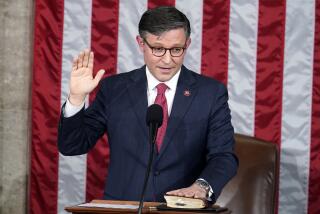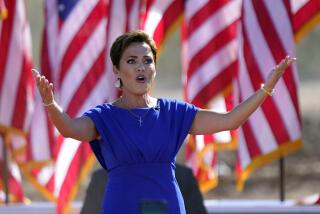Jeb Bush Treads Lightly Amid Political Dangers
- Share via
TALLAHASSEE, Fla. — After avoiding the spotlight for three weeks, Florida Gov. Jeb Bush is being thrust inexorably toward a more central role in his brother’s struggle for the state.
As the Republican-controlled state Legislature moves toward intervention in the dispute, the prospect is growing that the governor soon may sign unprecedented legislation to directly award Florida’s 25 electoral votes to his brother George W. Bush.
In his most extensive public comments yet on the controversy, Jeb Bush on Wednesday endorsed the arguments of Republican legislative leaders who say they have a constitutional right to directly appoint the electors if it appears the legal disputes over the Florida results won’t be completed in time to assure that the state participates in the electoral college.
“If there is uncertainty, the Legislature has clear, delegated authority from the U.S. Constitution to seat the electors. I admire them for, at least on a contingency basis, accepting that responsibility and duty,” Bush said outside a meeting with his Cabinet. “Let’s face it, if there’s indecision about who those electors are by Dec. 12, it would be a travesty not to have electors seated at the electoral college from Florida.”
In private, however, sources close to Bush say that he recognizes the political cost could be high if he signs legislation to deliver the state and the presidency to his brother--especially if the state courts authorize further recounts that give Al Gore the lead.
“The political ramifications down the road are going to be significant, for Jeb, for W. potentially, for the whole Republican Party,” said one senior political advisor to Jeb Bush. “If it looks like we are forcing this down people’s throats, the 2002 election could be a blood bath.” Jeb Bush will face reelection then.
With those concerns in sight, sources say, Jeb Bush is actually more cautious about proceeding toward legislation than the aggressive conservatives in the state House of Representatives--who are leading the drive to call a special session, perhaps as soon as Friday. Bush appears more in tune with the state Senate, which generally has been more cautious.
But those around him say Bush is prepared to support the Legislature--and ultimately sign the legislation--if that is what it would take to ensure the state provides his brother the winning margin for the White House.
“It’s not the way they intend to win,” said one senior Republican operative in contact with both Bush brothers, “but they intend to win.”
Although Jeb Bush has kept a low profile, Florida Democrats see his fingerprints all over the legislative maneuvering now underway. Incoming House Speaker Tom Feeney, a staunch social conservative who has been the most prominent advocate of a special session, was Bush’s running mate in his unsuccessful 1994 bid for the governorship, and remains a close ally.
That link alone convinces Democrats--and indeed many Republicans--that the Legislature ultimately will not take action without Jeb Bush’s approval.
“The governor looms very large in this state. . . . He has tremendous influence over the Legislature,” said Democratic House Minority Leader Lois J. Frankel of Palm Beach. “He has been appropriately low-key, but he cannot help the fact that he’s the brother of George Bush. Whether it’s direct or indirect, [Bush and the legislative Republicans] are on a mission to deliver [to] George Bush the state’s 25 electoral votes.”
Those around Jeb Bush say he is not at this point heavily involved in planning or strategizing for a possible legislative special session. Despite all the turmoil, advisors say he has not allowed the struggle to consume him and instead has focused mostly on state business. “It’s not like he gets up every day and figures out how can I bend or twist something,” said another of the governor’s political advisors. “He thinks his brother won . . . [but] he is not quarterbacking minute to minute.”
Still, both Feeney and Senate President John McKay--a somewhat more restrained, business-oriented conservative from Tampa--acknowledged that they recently had discussed the prospect of a special session with the governor. Feeney seemed to suggest Bush had encouraged him on that course.
“He is very respectful of the obligations we have as a Legislature,” Feeney told reporters. “The basic tenor of his statement was: ‘It’s not going to be like walking through a rose garden necessarily.’ ”
Feeney added, “he did not say: ‘Let’s go call the special session.’ ”
That cautious approach has been typical of Jeb Bush since election day. More cerebral and less voluble than his older brother, Jeb Bush has kept his public involvement in the imbroglio to a minimum; for instance, he quickly recused himself from the state election canvassing commission, the board that certified the final results.
But Capitol observers say Bush has left little doubt about his interest in the outcome. Six Bush aides took unpaid leave to work in the Republican effort after Nov. 7. Most notably, his acting general counsel, Frank Jimenez, took a 10-day leave of absence the day after election day to help plan Republican legal strategy.
The Miami Herald reported that Jimenez contacted Election Commissioner Clay Roberts shortly before Roberts issued his opinion two weeks ago that hand recounts were not permitted in Florida except in case of voting machine failure; that opinion, struck down by the state Supreme Court, sidetracked the recounts for several days in Broward and Palm Beach counties--and contributed to the latter’s failure to meet Sunday’s deadline for completing manual recounts.
Bush took another aggressive step on Sunday, when he signed a “certificate of ascertainment” formally naming Florida’s electors for his brother almost immediately after the state canvassing commission certified George Bush as the winner. Only a handful of other states have delivered those papers to the federal government yet, and Democrats here believe Jeb Bush moved so quickly in part to help his brother argue that the Florida results are no longer realistically in dispute.
But Republican strategists recognize that the governor’s possible involvement in legislation delivering the state to his older brother would be far more controversial than anything he’s done so far--and much more politically dangerous for both men.
No state legislature has ever directly named a slate of electors in an effort to supersede those chosen through the popular vote--as Florida legislators would be doing if the courts order further recounts that give Gore the lead. That the candidate’s brother could ultimately sign that historic legislation only intensifies the threat of a public backlash against both men, many Republicans acknowledge.
“It has the look of a South American political system,” the senior GOP operative said. “The public relations look of it is just bad. . . . It would become the central issue in Jeb’s reelection campaign. None of this makes it easier for him in two years.”
Other GOP operatives acknowledge that intervention by Jeb Bush could also cloud the legitimacy of a Bush presidency.
Hoping to slightly ameliorate those risks, Republicans here and at the Bush campaign in Austin, Texas, have discussed scenarios that would allow legislation delivering the electors to George Bush to become law without Jeb Bush’s signature. One way might be to pass a concurrent resolution, which would not require the governor’s signature. Attorneys for legislative Republicans indicated Wednesday that they favor that option, but questions remain about whether it would pass legal muster.
Legislation also can become law without the governor’s signature if it sits on his desk for seven days. But Republicans may not have time to pursue that approach and meet the Dec. 12 deadline for selecting their electors; in any case, McKay publicly denounced that option this week. “I think we all need to stand up and take responsibility for our actions,” he said.
On Wednesday, Bush strongly suggested he would sign such a bill. “I would sign it if I thought it was the appropriate thing to do,” he said.
Yet those around him believe both Bush brothers, cognizant of the political dangers, would prefer almost any other alternative to direct legislative intervention. Sources say Jeb Bush is particularly aware of the risks of signing a bill that seems to overturn the popular will, if Gore somehow takes the lead. “That’s what you would like to avoid,” said a top Jeb Bush aide.
And in fact, if future recounts gave Gore the lead, and Bush still signed legislation giving the state’s electors to his brother, the Florida governor’s political exposure would be just beginning. If the Legislature’s intervention survives the inevitable court challenge, Congress would then have to choose between a slate of Bush electors chosen by the legislators, and a slate of Gore electors produced in the process authorized by the state courts.
In Washington, the Republican-controlled House surely would tab the Bush slate; since the Senate is now split 50-50, Gore himself could cast the tie-breaking vote for the upper chamber.
That’s when Jeb Bush would return to the spotlight: Under federal law, if the two chambers of Congress split on which slate of electors to recognize, the decision is handed back to the governor of the state that sent them. Which means that sometime in January, Jeb Bush may be able to personally cast the tie-breaking vote that makes his brother president of the United States.
(BEGIN TEXT OF INFOBOX / INFOGRAPHIC)
Profile: John Ellis “Jeb” Bush
* Born: Feb. 11, 1953, in Midland, Texas. Son of former President George Bush and his wife, Barbara. Brother of Texas Gov. George W. Bush.
* Education: Bachelor’s degree in Latin American studies, University of Texas, 1974.
* Career highlights: Vice president for the Texas Commerce Bank in Venezuela, 1974-80; Commercial real estate developer, 1981-94; Dade County Republican chairman, 1984-86; Florida commerce secretary, 1987-88; Ran unsuccessfully for Florida governor in 1994; Elected governor in 1998.
* Family: Married 26 years to the former Columba Garnica Gallo. Three children: George, Noelle and Jeb.
* Quote: “I would sign it if I thought it was the appropriate thing to do.”--When asked if he would sign legislation creating a slate of electors for his brother.
More to Read
Get the L.A. Times Politics newsletter
Deeply reported insights into legislation, politics and policy from Sacramento, Washington and beyond. In your inbox three times per week.
You may occasionally receive promotional content from the Los Angeles Times.










